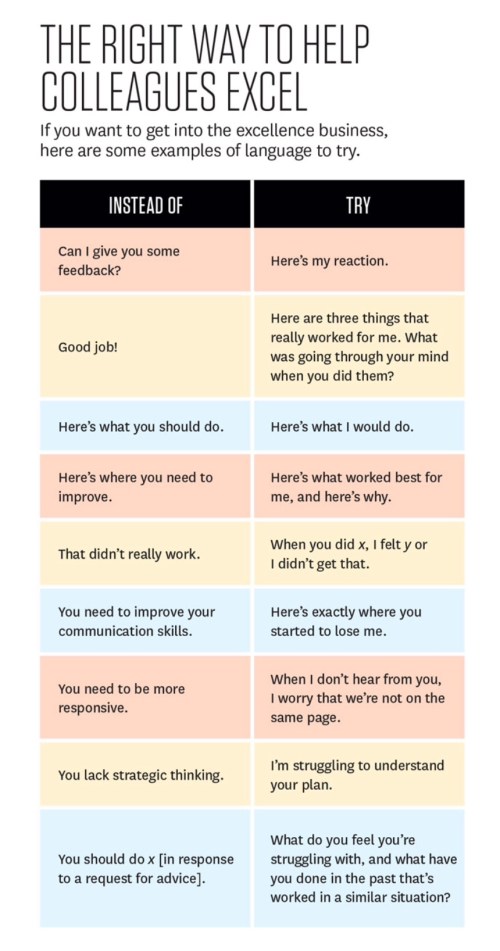The Right Way to Help Colleagues Excel – Harvard Business Review
Having just completed annual provider reviews, this sobering and thought-provoking article in the Harvard business review caught my attention, partly because of how you could give better feedback but also because in the business world they apparently don’t have to stick to a formula or protocol like we are supposed to do in medicine. I guess they want people who can think for themselves??
”How to give people feedback is one of the hottest topics in business today. The arguments for radical candor and unfurnished and pervasive transparency have a swagger to them …… But at it best, this fetish with feedback is good only for correcting mistakes-in the rare cases where the right steps are known and can be evaluated objectively and at worst it’s toxic because what we want from our people-and from ourselves-it is not, for the most part tidy adherence to a procedure agreed-upon in advance or, for that matter, the ability to expose one another’s flaws. It’s that people contribute their own unique and growing talents to a common good, when that good is ever evolving, when we are, for all the right reasons, making it up as we go along. Feedback has nothing to offer to that.”

https://hbr.org/product/harvard-business-review-march-april-2019/BR1902-MAG-ENG
*
Beyond the Borderline – The Lancet Psychiatry
I had another Saturday wrap-up with my Behavioral Health Director last week, and I asked if he thought a mutual patient had Borderline Personality Disorder. He didn’t think so, because he doesn’t believe in it. I still can’t quite wrap my head around it, so I guess I don’t believe in it either. Looking for an update, I found this in The Lancet Psychiatry:
“Borderline personality disorder is not so much a diagnosis as it is a liminal state. Individuals to whom the label applies exist between mental illness and mental health, between experiencing an acute condition and a chronic condition, and between being highly visible to clinicians, yet invisible to major epidemiological projects such as the Global Burden of Disease. The diagnostic criteria for personality disorder fall between the objective descriptions expected of medical manuals, and value judgements based on received opinion. DSM-5, for example, includes diagnostic criteria of inappropriate, intense anger. It is hard to conceptualise anger that is not intense in nature; and as artist, writer, and mental health trainer Rachel Rowan Olive asks, “Who decides when anger is appropriate?” The past few years have seen events such as the revelations regarding child abuse in the Catholic Church and the global #MeToo movement, which have given survivors of exploitation and injustice platforms with which to share their stories and experiences. Their anger would perhaps have been considered inappropriate and intense only a decade or so ago, by societies in denial about the existence and the extent of their problems. Despite these advances, it is still possible that people with a history of abuse might suffer twice: first from the abuse itself, and second from having their resulting emotional response pathologised.”
https://www.thelancet.com/journals/lanpsy/article/PIIS2215-0366(19)30051-3/fulltext











Here’s my reaction, I do enjoy your posts. lol.
It’s nice to know that one doctor somewhere does actually have a heart. I once had a doctor like you, one out of twenty you are. When I read your posts it gives me hope. I’m just a patient physically and mentally struggling with illness management juggling!
The NHS borrows heavily from the US medical healthcare model, even down to charging – which is free at point of usage in UK. I’ve just been diagnosed with F43.2 and F60.3 – I was diagnosed with different codes last year at assessment and the year before at assessment – apparently it will still be a further 8-12 months before any treatment may start. At least I can look these codes up and see what they have summed me up as but I do fail to understand if I haven’t had any actual treatment for three years only assessments why the codes are so important.
Docs letter is full of words like dissociative state and profound anger – at least she sent this one by recorded delivery after I questioned the necessity of writing everything I said word for word, including assaults and then sending it through the general post.
Lots of consultations but never any treatments. That is esssentially the english UK NHS healthcare system. For some it works super well. For others it doesnt’ matter where I turn, I don’t get anywhere, just losing time, I’m a lab rat who is being observed overtly – to see my reaction of watching others get treatment it feels it deserves.
I am going to write about a GP visit I had last week which I think may shock you. We’ll see. In the mean time “Good Job” lol and thank you.